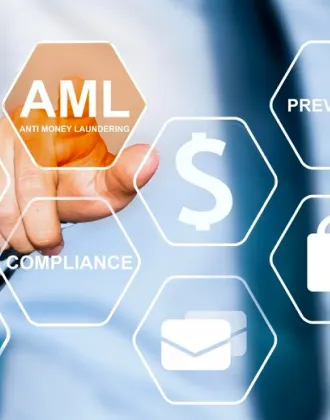
Anti-money laundering auditing
Last Update: 24.12.2023
To operate successfully and legally in any finance-related field, it is important to comply with AML standards. If you are considering operating internationally, carefully review the AML rules of the various jurisdictions to ensure that your project is operating legally
What is AML audit?
A compliance audit or AML audit is a comprehensive independent analysis of a company’s business processes, documentation mechanisms, personnel qualifications, and control systems. The main objective of such an audit is to assess the extent to which current corporate processes and standards meet established AML regulations and legislative rules. In addition to identifying possible vulnerabilities, the audit also aims to provide recommendations to improve the control system and enhance the effectiveness of financial crime control methods.
In addition, audits can be used as evidence of companies’ compliance before banking institutions, regulators, investors, and partners.

Find out more information about the Anti-Money Laundering (AML) Audit
Who is Eligible to Conduct an Independent AML Audit?
By 21 paragraphs of the Money Laundering Regulations, Anti-Money Laundering Auditing is legally authorized:
- law firms
- real estate companies
- specialized consulting companies
Note that audits should not be conducted solely by the internal AML specialist responsible for reporting or by members of the Anti-Money Laundering team. The audit should be independent and not conducted by a company representative. Ideally, an independent third party in the form of a competent firm specializing in this area should be involved.
Moreover, the staff conducting the audit should have professional knowledge and an in-depth understanding of AML and how it works in different jurisdictions. Employees need to be competent in the tasks of analyzing, collecting, and reviewing documents, as well as following all established procedures. One of the main tasks is to identify areas with vulnerabilities and provide advice on optimizing them.
What does an independent AML audit consist of?
An independent AML audit is a detailed analysis of the extent to which a company follows the basic AML rules. This process includes important steps such as:
- Examination of corporate policies and practices: Analyze the existence and proportionality of corporate directives, practices, and control measures that aim to prevent illegal financial transactions.
- Evaluate Legal Compliance: Examine how the business complies with current AML laws and regulations.
- Tracking System Assessment: Determining the effectiveness of tools designed to recognize and document questionable financial activity.
- Assessment of professional development for employees: Study of the level and frequency of training programs for employees on AML topics.
- Potential Risk Analysis: Identification and study of potential threats associated with illegal financial transactions specific to the company’s business model.
- Customer Database Verification: Investigation of customer record keeping and verification methods, and analysis for the availability of all necessary customer data.
- Breach Response Assessment: Examination of the actions the company takes when breaches or vulnerabilities in the AML system are identified.
Upon completion of the study, a document is generated that presents the identified weaknesses and proposals for their resolution.
Objectives of AML Audit
AML (Anti-Money Laundering) audit is a critical tool for any modern company, especially for financial institutions operating in an international context. The company must show its responsibility in preventing money laundering and combating the sponsorship of illegal activities by implementing a solid control system and organizational structure.
The main objectives of an AML audit are:
- Determining compliance with current laws and regulatory requirements.
- Identifying vulnerabilities in control and monitoring systems.
- Investigation of potential hazards.
- Evaluating the effectiveness of current AML procedures and measures.
- Control and verification methods.
- Providing recommendations for system improvements.
The importance of AML audits:
- Protecting a company’s reputation. Direct and indirect losses from AML violations can be catastrophic to a company’s reputation and economic stability.
- Legal Compliance. Failure to comply with AML policies can result in fines and other negative legal consequences.
- Minimizing financial risks. Financial crimes are often linked to other frauds and scams, which can result in significant monetary losses.
Anti-Money Laundering Auditing is not just a mandatory requirement, but a powerful tool to protect a business from the risks associated with illegal activities. This type of audit assures a company’s management that its operations comply with international standards and national laws and that the company is protected from potential threats.
Importance of AML Compliance
Anti-money laundering compliance is a fundamental component of responsible business conduct in today’s economic environment. The direct impact of this problem on the stability of financial markets emphasizes the urgency of addressing it, as illicit capital flows can create serious distortions in the economic balance and contribute to the expansion of the underground economy.
For corporations, especially those operating on the global stage, maintaining a clean reputation is a priority. The interconnection of money laundering with other forms of economic activity, such as fraud or the financing of extremist activities, emphasizes the relevance and importance of this challenge.
Client-oriented approach and protection of business partners’ interests also bring AML compliance issues to the forefront. An effective AML policy ensures not only legal protection of assets but also trust from clients and partners. It is important to realize that non-compliance with these standards can lead to serious legal consequences, including significant fines and criminal liability.
Taken together, strict adherence to anti-money laundering principles and requirements is not just a formal condition, but a strategic choice aimed at ensuring a sustainable and transparent business process that builds international economic confidence.

AML Audit Reporting
In financial transactions, the emphasis on corporate integrity and transparency stands especially high. AML reporting is not only a prerequisite for regulators, but also key to building trust from partners, investors, and customers.
Audit reporting provides an objective view of how well a company is meeting established standards and identifies potential vulnerabilities or breaches. It is an important step that helps organizations improve their internal processes, minimize risk, and ensure compliance with legislation.
Such reporting typically includes:
- Analyzing the company’s internal procedures and policies in the context of AML.
- Evaluation of transaction monitoring and tracking systems.
- Review of staff training programs and their relevance.
- Analysis and evaluation of responses to identified violations.
Drafting and analyzing such documents requires high qualifications and an understanding of market specifics, as the consequences of errors or omissions can be catastrophic not only financially, but also in terms of the company’s reputation.
Which Companies are Required to Conduct AML Audits?
The companies required to conduct AML audits are determined by the legislation of a particular country. In most jurisdictions, this list includes organizations from the financial sector and other companies that may be vulnerable to money laundering or terrorist financing. In any case, such companies and organizations include:
- Cryptocurrency exchanges and wallets.
- Banks and lending institutions.
- Brokerage and dealing companies.
- Money transfer companies.
- Law and accounting firms.
- Casinos and other gambling operations.
It is important to note that AML audit requirements may vary depending on the jurisdiction and the specific activities of the company. Therefore, it is recommended to consult with local AML specialists to accurately determine the need for such an audit.

Risk Assessment in AML Audit
A money laundering risk assessment plays a critical role in strengthening a business’s money laundering controls. Its primary purpose is to identify potential risks in key areas, assess current controls, and identify likely vulnerabilities.
The Federal Financial Institutions Examination Council (FATF) describes this process as “identifying and analyzing risks in specific areas such as products, customer base, services, and geographies..” Also, FATF in its Guidance emphasizes the importance of understanding an institution’s exposure to money laundering or terrorist sponsorship risks and identifies the necessary resources to mitigate those risks.
Effective AML risk analysis becomes key for financial institutions to fulfill their regulatory responsibilities.
What to look for:
- The nature of the business.
Certain sectors may be more susceptible to financial misconduct. For example, the banking, real estate, or cryptocurrency sectors are more likely to face attempts to launder funds. - Geographic coverage
Operating in countries with high levels of corruption or insufficient financial regulation increases potential risks. - Clients
The presence in the client base of individuals with political influence or from high-risk regions may be an indicator of potential problems. - Volume and nature of transactions
Unusual or large transactions, especially if they are inconsistent with a customer’s normal activity, may raise suspicion. - Modes of communication and transactions
Transactions through anonymous or unusual channels may be considered higher risk. - Internal control system
Lack of clear procedures for tracking and reporting suspicious activity can increase the likelihood of violations.
Based on the assessment, specialists make recommendations to improve the control system, reduce risks, and ensure compliance with AML legislation.
Fines for Non-Compliance (AML)
By 2022, the total amount of anti-money laundering (AML) penalties approached nine billion dollars. In many cases, these fines were caused by ineffective application of identity verification measures and Know Your Customer (KYC) systems or deficiencies in internal risk management procedures and mechanisms. However, cases of clear offenses, including assisting in tax fraud, also stand out among them.
Although such fines are typically imposed years after breaches in AML procedures have been identified, the main fines for 2022 are spread across the following sectors:
- Trading and brokerage services – over $6 billion;
- Banking – approximately $2 billion;
- Gambling – more than $71.4 million;
- Cryptocurrency market – $30 million;
- Asset management – over $2 million.
Fines for AML violations can be imposed on organizations and individuals who fail to comply with relevant laws and regulations. Fines can vary depending on the country and the specifics of the violation. They can reach many millions and sometimes billions of dollars, especially for large financial institutions. In some jurisdictions, CEOs can also be held personally liable for serious violations of AML regulations.
In extreme cases, in the case of serious or systematic violations, financial regulators can suspend or revoke licenses, effectively shutting down an organization’s operations.
Connect with our experts
Our experts will tell you how to do it as quickly and easily as possible.
By clicking the button, I confirm that I have read the privacy policy and consent to the collection and processing of my personal data in accordance with the GDPR rules.